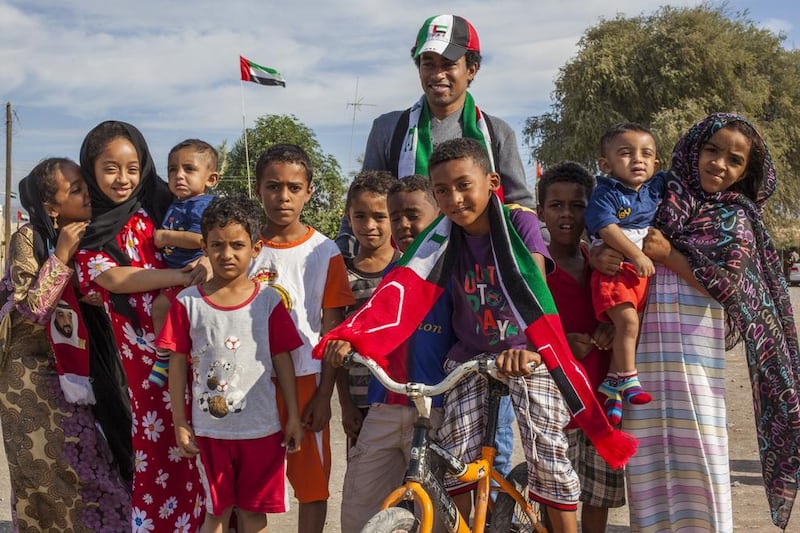For generations, they were without a state. But this month those citizens, who call a northern Ras Al Khaimah village home, celebrate a nation that has never, on paper, been their own.
National Day in Shabiat Al Baluchi is not just an expression of hope, residents say. It is a celebration of what they have and a land they call home, whether or not it is recognised as such.
Preparations are under way for a performance in front of Sheikh Saud bin Saqr Al Qasimi, Ruler of Ras Al Khaimah, on Thursday.
For a long time, residents here were bidoon – people without a nationality whose forefathers moved to the UAE before its formation in December 1971.
Their ancestors came from the coasts of Iran and Pakistan at a time when borders did not exist. Baluchis have lived here for centuries, owning land and tending date gardens on the northern and eastern coasts.
As in other north-coast villages, National Day is not a single day but a month-long celebration that begins when residents pool money for enormous flags and kilometres of tringed lighting.
Early this month, residents strung UAE bunting over alleys and replaced old, tattered flags with shining new ones emblazoned with the Spirit of the Union logo – the silhouette of the founding fathers.
National symbols can be found here year-round. Metal doors are adorned with falcons, the symbol of the Armed Forces, and UAE and Ras Al Khaimah flags.
When children return from school in the early evening they gather with their parents to practise Emirati songs they will perform for Sheikh Saud. Some days, they sing until midnight.
During the day, mothers sew Baluchi-style embroidered dresses in UAE national colours.
Jalal Mohamad, 27, describes plans for a stage that will be raised on November 25 and a lit promenade that will run from his father’s arugula patch to the grand stage for Sheikh Saud.
“This road will be all flags and lights,” he says. “We will do it by hand. We won’t pay others to help us.”
Just two years ago, residents here were without citizenship. In May lat year the bidoon took citizenship of the Comoros Islands, an Indian Ocean archipelago about 300km east of Mozambique. They were told this was necessary to legalise their status in the UAE as a first step towards receiving UAE citizenship.
There are up to 10,000 stateless in the UAE, according to official estimates. Authorities fear that many who claim to be stateless are of Iranian, Syrian or Palestinian origin who destroyed their passports.
In July last year, the Children of Emirati Mothers Committee set up a transparent process for reviewing applications. At that time, the committee agreed to grant applicants access to health care and education. The committee was established by the President, Sheikh Khalifa, in December 2011 to grant citizenship to children of Emirati mothers married to non-nationals through a process of in-depth interviews and research.
Since the committee’s shift to focus on the stateless, access to Government services has improved and people are hopeful once again.
There are big changes in Mr Mohamad’s family. His married brother received a family book that entitles him to government services. In the autumn, his sister Fatima, 19, began an engineering degree at the Women’s College, a post-secondary institute for Emiratis.
When his sister delivered twins last month, the Government covered the medical expenses and the twins were issued birth certificates, a shift from a policy that made it difficult for the stateless to get these documents.
His uncle was able to marry an Emirati woman after he received his Comoros passport. As a bidoon, this had been impossible.
Some children have begun to attend public schools alongside Emiratis once more, allowing for tighter integration. Public schools offer morning classes for Emiratis and afternoon classes for expatriate Arabs. Bidoon were formerly placed in classes for expatriates.
More Emirati Arabic is spoken to children at home instead of Baluchi, an Indo-European language.
“Now the children don’t know Al Baluchi,” Mr Mohamad says. “We’re not killing the language, but we teach them local Arabic.”
When Mr Mohamad was a pupil, expatriates and Emiratis attended school together. He became fluent in Emirati Arabic, the Shamaili Arabic of the wadis near his village and the more widely spoken Shihuh, a south-Arabian language spoken by many of the country’s mountain tribes. The three Emirati dialects are mutually unintelligible.
Having a passport for the first time has brought small changes, such as holidays abroad, and more significant ones. Fatima travelled outside the country for the first time this year to perform Haj with her father. Mr Mohamad went on holiday to Thailand.
“I went to Arab Street in Pattaya but I felt like I was in UAE. You know why?” he asks.
“When I went there I saw one guy who said, ‘Hi Jalal, how are you?’ He said he was in my class in school. I said, ‘I’m in Thailand and they know me? I’m in Thailand, how many miles away?’.”
This will be the village’s biggest National Day celebration in 10 years and there is an open invitation for anyone to visit.
“We celebrating this day because we are very happy about the Government, about what they are giving to us,” says Jalal’s father, Mohamad Ahmad. “This celebration is about this land, not about our documents and our papers and what we don’t have.”
Mr Ahmad, who is about 60, came here from Qatar as a teenager. His father was a trader who owned land in Oman.
Women will cook khameer bread, and qimat, both UAE favourites.
“We must celebrate. It is our country,” says Amna Ibrahim, 42, one of the women sewing and cooking for the big day. “Our passport will come later. One year. Two years. Ten years?”
Yasmeen Dochambay Jumaa, 42, a mother of four who was born here, nods her head. “Maybe. God is generous.”
Last year, dozens from the village walked up and down Al Qawasim Corniche drumming to the national anthem.
Citizenship is important for education and employment opportunities. Mr Mohamad has been unemployed since a car crash in March last year and is actively seeking work.
Land is not an issue. They bought their land from Shimal’s emir, Al Bilhoon, who had the rights.
“Now we are bidoon still, but when we have the Emirati citizenship we will be happy, so we can send our children to university and college,” Mr Mohamad says. “We can make our life better than what we have now and we can say to the people, ‘Yes, I am Emirati’.
“If somebody now asks me I say, ‘I’m Emirati’. From origin, from inside, we’re Emirati. This, nobody can fake.
“I don’t know about other countries but I know about this country. The other countries, I don’t know about their culture. I know how we are living. Each person here loves their Government.
Mr Mohamad’s father made trips to Abu Dhabi throughout his life for interviews, following several initiatives over the last 30 years to grant the stateless citizenship.
“You know, everywhere people ask me, ‘Where are you from?’ I say, ‘UAE’. Some people act like I’m nobody. Some people, they ask, ‘Oh, what is this?’,” Mr Mohamad says.
“I know that people speak about these things, but we don’t care as long as we know that we have this country.”
When asked what being Emirati means, Mr Mohamad pauses for a minute and then answers.
“All of the Emiratis help each other, even if they don’t know you. They’re always working as one hand, for everything. That makes them different than the others,” he says.
“They’re all communicating together and they’re very close. When you say, ‘This is an Emirati in trouble’, or even people from other countries, they help them. They jump to help them.
“For us, Emirati is everything. It’s not about National Day, it’s my homeland. As Emiratis are celebrating their country, I am as well.”
azacharias@thenational.ae






